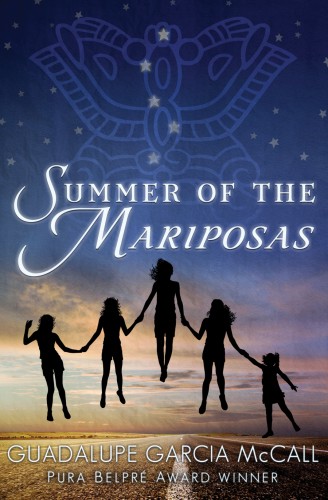As someone who's long felt that
young adult literature, like most, has been sorely lacking in the diversity
department, I consider myself a supporter of Tu Books. Sure, not everything
they publish is great or even particularly better than the usual whitewashed
speculative fiction on the shelves, but at least the authors there try to do
something different. So when I found out that one of the authors associated with
Tu, Guadalupe Garcia McCall, published a novel that sounded right up my alley,
I knew I had to take a look.
The novel, Summer of the Mariposas, is a strange beast to talk about. At first glance, it’s another young adult fantasy book, only based on Mexican and Aztec folklore. You’ve got the insecure but brave protagonist, Odilia, her four little sisters, who are all brave and have their own unique personalities and motivations, their worried and considerate mother, and an adventure that involves magic and divine mentors. However, when one actually digs into the book, it reveals itself to be one of the more unique YA fantasies I’ve read, if even a fantasy at all: the girls are traveling the Mexican border with a corpse in their estranged father’s car, there is no romance to speak of, and this story is more magic realism than traditional fantasy at heart—magic is treated like anything else in the narrative. Above all, even, the biggest conflict the girls encounter is dealing with a reunion with their father who abandoned them a year back.
As a character reader and writer, I immediately found myself hooked on the characters. Juanita easily became my favorite of the sisters for her intelligence and her insecurity, reminding me of myself at that age. The other sisters are generally well-drawn as well: Pita, the youngest, dealing with her weight issues and getting her older sisters to admit she’s growing up; the twins, Velia and Delia, with the way they work hard to grow up and pretend to be each other, in classic identical twin fashion; and the narrator, Odilia, who is arguably the least interesting character, who still grows as a sister, role model, and human being over the course of the story. The side characters were also generally interesting, if more two-dimensional, including La Llorona and Chencho.
The world building was often solid. The way McCall weaved traditional folklore with the real-world problems of a struggling Mexican-American family made the more sensational aspects of the story more human, if less logical (I’ll get to that later). The explanations were often very light, but any reader of speculative fiction for younger readers is often used to this, unless they more often read stories set in completely fictional worlds.
Being honest, the plot of this story was a bit jarring. Not necessarily in what took place, but in how it was presented to the reader. The book is set into three parts; each part opens with a summary of what happens, which makes the actual events in these chapters rather anticlimactic. Then again, it’s not the destination that matters but the journey, right? That is true and could apply in this case if not for one problem: Despite all the conflict during the more fantastical parts of the story, the drama and tension just aren’t there—the reader realizes halfway through the book that every villain is generally found extremely quickly and beaten in almost as little time. Also, I found the magic earrings Odilia received, which allowed her the option to ask a goddess to do whatever she wants, extremely contrived and made almost everything too easy. Worst of all, though, is how the sisters fail to realize they’re being tricked except for one notable moment at the end of the story. This is a plot point, true, and I should accept this, but the excuse of “this is a book for a younger audience” rings hollow when the author and the writing style make many of the twists in this book seem extremely obvious early on.
Yet the ending of the novel almost completely redeems it in my eyes. The third and final part of the novel is when the fantastical elements are left almost completely behind—or at least relegated to the side—in favor of family drama. And I enjoyed the novel much more in this vein. The girls truly grew into their own by this point, and the ending is about as satisfying an ending as I could have hoped for considering the sad state the family was in, as described in the prologue.
Overall, I enjoyed the novel. I have my issues with it, of course, and would struggle to call it a favorite in any event, but these are my own personal qualms. Several blogs and professional critics have expressed admiration for this novel and it’s easy to see why that is. Summer of the Mariposas is a good book to give to girls ten and older, if only to help introduce them to more Mexican folklore, the Spanish included in the narrative and glossary at the back, and to add to the growing collection of young adult novels that feature several female main characters with no romance included. (I say this as someone whose favorite novels almost always feature female main characters who end up with someone. I just wish for variety.)
Score: 3.5/5

No comments:
Post a Comment